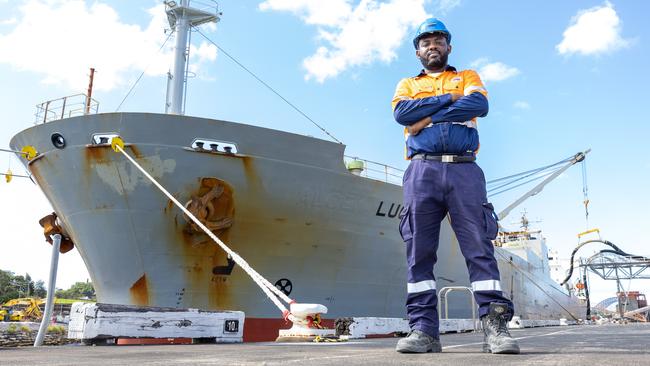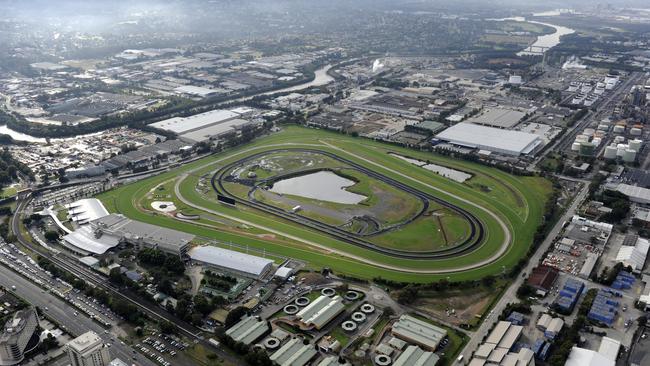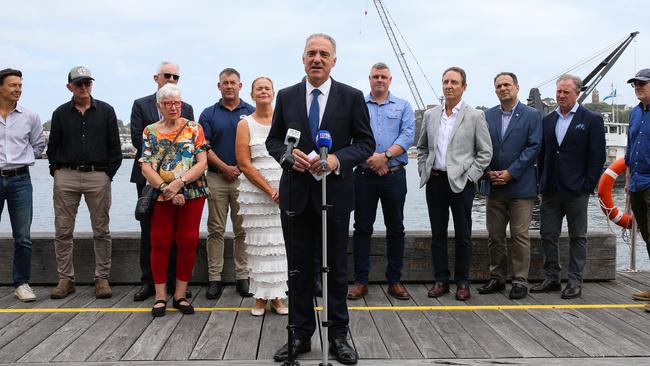Glebe Island port coalition says they should not be fallback for failed Rosehill housing precinct
In the fallout to Australian Turf Club members voting against the sale of Rosehill racecourse, an industry group fighting to save Glebe Island port says it should not be the “fall guy” for the failed attempt to build a 25,000-home mini-city.

NSW
Don't miss out on the headlines from NSW. Followed categories will be added to My News.
The industry group fighting to save Glebe Island port says the industrial hub should not be the “fall guy” for a failed attempt to turn Rosehill racecourse into a 25,000-home mini-city.
Sydney’s Working Port Coalition called on Wednesday – without success – for the NSW Government to “immediately rule out” replacing the Rosehill proposal with a high-density apartment plan for Glebe Island.

Consultation on the island’s future has dragged on for months with the Coalition recently calling for government to consider a hybrid model where the vital maritime hub can continue operating, surrounded by residential development.
The NSW government has consistently said a decision has not been made on whether to shut down the port to make way for housing to complement the nearby Bays metro station – planned to open in 2032 – or whether the two can coexist.
But the decision by Australian Turf Club members to vote down a sale of Rosehill racecourse, and the mystery surrounding a “Plan B” floated by Premier Chris Minns in the wake of Tuesday’s result, has sparked concern within the Coalition.
“They (the plans) are not ready for me to announce today and not everyone will love them but they’re absolutely necessary for Sydney,” Mr Minns said.

Planning Minister Paul Scully further fuelled speculation on Wednesday when he did not rule out closing the port to fill the shortfall left by the failed Rosehill housing plan.
Mr Scully told parliament that the Bays Precinct will be rezoned for more homes, to be co-located with a new Metro station.
“It is no secret that around the Bays Precinct there’s going to be a new Metro station in 2030, and it’s also no secret that the area is part of the Transport Oriented Development accelerated precincts,” he said.
“We’ll undertake a rezoning process there because it makes sense to co-locate housing with jobs and transport.”

Coalition spokesman and Business Sydney Executive Director Paul Nicolaou told The Daily Telegraph the group wanted the government to “rule out using Glebe Island as a fallback for its CBD housing strategy, following the collapse of the Rosehill housing deal with the ATC”.
Mr Nicolaou added: “The stakes are too high. Closing Glebe Island Port would be a catastrophic economic mistake, disrupting Sydney’s supply chains, inflating construction costs, and permanently damaging the state’s industrial future — all during a housing crisis.”
As revealed by this masthead earlier this month, the Coalition has written to the government urging it to consider the hybrid model.
Within its submission, the Coalition cited international examples where working ports coexisted with residential developments in major cities including Rotterdam, New York, Gothenburg and London.
“The NSW Government must not gamble Sydney’s future on a shortsighted, economically destructive decision,” Mr Nicolaou said.
“Glebe Island is too valuable to lose — and keeping it operational is the only choice that makes sense.”

The Coalition also outlined the key role Sydney Harbour’s last working port plays in NSW’ss economy, with 40 per cent of Sydney’s cement and all its gypsum for construction being offloaded at the facility.
Sixty per cent of Sydney’s food-grade sugar also lands at Glebe Island port while the harbourfront operations are critical to the New Year’s Eve fireworks, Vivid, Sail GP and other headline events.
The Royal Australian Navy has also confirmed the importance of the port to defence operations.
“This port has injected $29 billion into Sydney’s economy over the past 30 years and underpins over 5,000 jobs,” Mr Nicolaou said.
“Once lost, deepwater ports like Glebe Island are gone for good.”
More Coverage
Originally published as Glebe Island port coalition says they should not be fallback for failed Rosehill housing precinct




